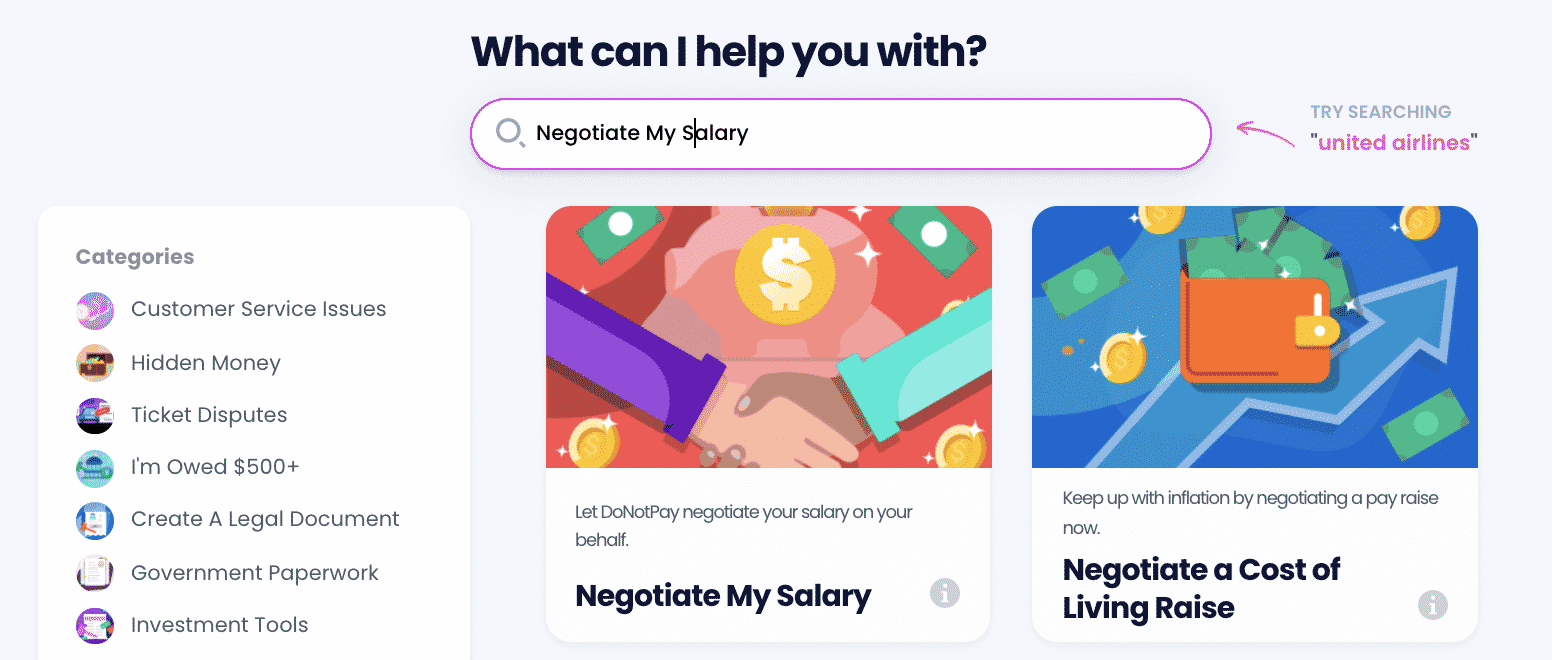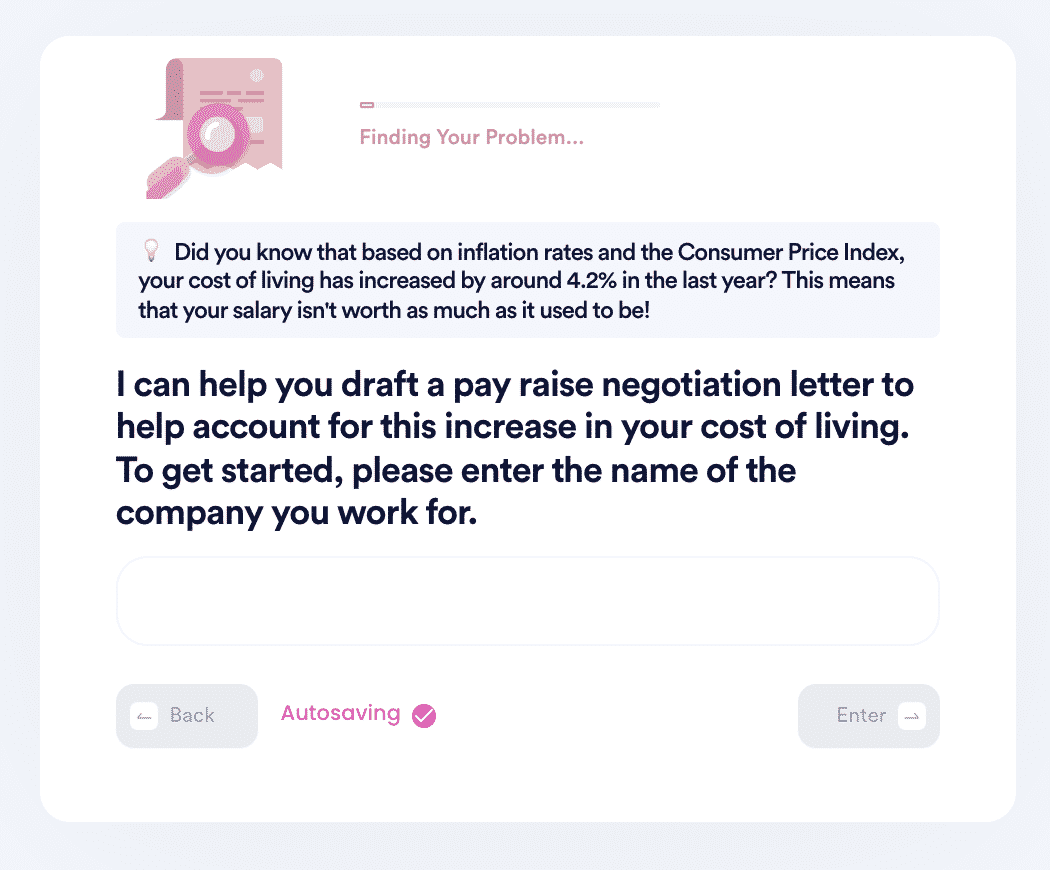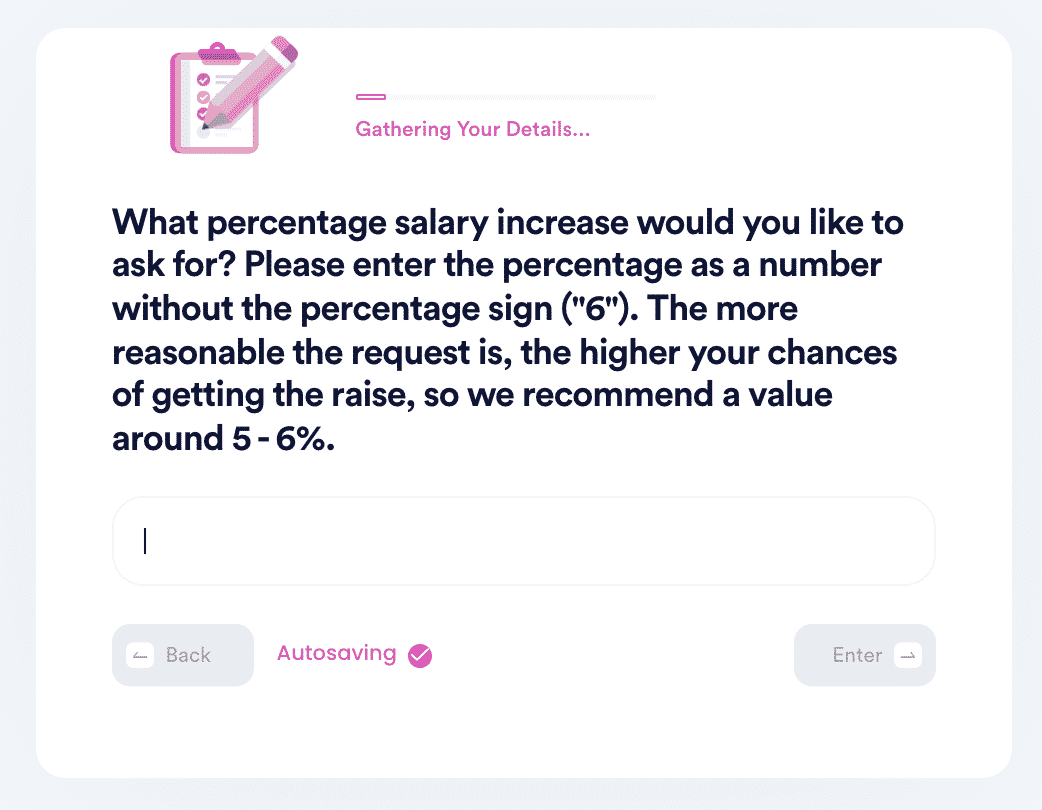Use This Script to Ask for a Raise and Get It
Being a stellar employee or having worked at the same company for such a long time is an invaluable service that each organization ought to recognize. Most often, such recognition comes in the form of a salary raise. However, not all companies do it. This post, detailing how to shows you how you should negotiate for a better salary when you need to.
Find tips on how DoNotPay can help make the process of asking for a raise faster and less frustrating as well.
Reasons to Get a Raise
As you progress in your career, your salary needs to match the growth. While your employer may know the appropriate time to give you a salary raise, sometimes it is important to show initiative and request it.
Below are some of the reasons why you should consider yourself entitled to a salary raise:
- You have assumed more responsibilities at the company. As you advance in a company, you will more likely get more responsibilities than when you were just starting. Eventually, you should get higher pay if you are on your way to a higher-level position.
- You got a promotion. Before accepting a promotion, ensure that you will receive higher pay in your new position. Otherwise, you will be doing more work for the same pay you were used to at your junior position.
- You have been with the company for a lengthy period. Your employer should be aware of your responsibilities as life progresses while you are still with their organization. Otherwise, with the cost of living increasing, you may be compelled to seek another job at another company that pays higher.
How Much of a Raise Should I Get Each Year?
One of your career goals should be to get at least one salary raise each year. The amount you ask for could depend on your role in the organization and how long you have been working at the said company. The general good idea is to request 10% to 20% higher than your current salary. However, based on your contribution to the company, current market rates for people in your role, and other prevailing factors, you could ask for more. After all, you can lower your target during negotiations with your boss.
According to a survey by Willis Towers Watson, numerous companies are planning significant raises for their staff in 2022. With the average rate for the raises being 3% and below since 2014, WTW reports that it has now risen to 3.9%, majorly due to the inflation currently ongoing globally. Professional employees, those in management, corporate executives, and support workers can expect raises as high as 3% while manual and production laborers should expect raises averaging 2.8%, as the WTW report indicates.
How to Ask For a Raise
Throughout your career, it is not just enough to know your continual worth. You need to have the guts to ask to be paid the equivalent of it. After all, failing to speak up could leave your boss thinking that you are satisfied with your current salary.
Use the following tips to successfully ask for your salary raise:
Ask at the Right Time
Choosing the appropriate time to ask for a raise could largely determine whether you get it or don't. Consider the following:
| The company's financial health | If the company is doing well financially, then it may be an appropriate time to ask for a salary raise. However, when there are layoffs and cutbacks, you should reconsider your request. |
| Your manager's workload | When wondering how to ask for a raise, be sure to consider the current workload your boss has. Avoid them when they are too busy. Being able to read their mood demonstrates your maturity, which you can even mention when asking for your raise. |
| Time of the year | There are certain periods during the year when compensation conversations are almost expected. For instance, when the organization conducts yearly or quarterly reviews or during the end of a fiscal year, the company could be reviewing its budget. |
| The significance of your accomplishments | When you have exceeded an important goal or reached an extraordinary career milestone, your bosses could already be impressed and ready to reward you with a raise. |
Do Your Research Well
Thinking that you want a raise is simply not enough. You have to know the amount you need your salary raised by and how it compares to the market value of your position. Your salary needs to fall within a particular range that is determined by the average compensation within the industry.
Start by considering your qualifications and then measuring your accomplishments. This should allow you to determine an average or generous pay increase that you can then take to your manager.
Set a Meeting
When asking for a raise, it is ideal to do it in private and in person. If it is impossible, such as when you don't work at the same location as your boss, opt for a video call when possible.
Avoid asking for a raise without a prior appointment on the calendar. The best place to also do it is also in a closed room, not when you bump into your boss in the hallway or the kitchen. If you can, avoid doing it via email too.
If there is an upcoming performance review, you might not have to set up a meeting as it is already scheduled. However, it is still a great idea to let your manager expect you to bring it up.
Here are a few ways you could describe your intentions via email:
- "Would it be okay if we used some of the time during my performance review to discuss my compensation?"
- "I would love to have a meeting with you to discuss my compensation. Please let me know when it can fit into your schedule."
Prepare Your Talking Points
Before the meeting day arrives, ensure that you have your talking points ready. Use the following guidelines to set your salary raise conversation:
- Rehearse. Anxiety and fear are natural feelings that could come up when discussing money and your value to the company with your boss. You can curb them by having a written script that you practice before stepping into the meeting. Ensure that the script focuses on your professional reasons for the raise rather than being personal.
- Start with an opener. This could include something such as, "Thank you for freeing up your time for this meeting. I am excited about increasing my responsibilities and ensuring the success of key company goals. This is my major motivation towards wanting to discuss my salary."
- Follow up with specifics. If your manager shows openness to the discussion, dive deep into the increase you need, your justification for the amount, examples of your work, and a metric to clarify your statements.
For instance, if you are the leader of your nursing team, you could say:
"During the last few months I have coordinated my RNs to ensure that each of our posts is covered at all times, which has resulted in the dental wing functioning at its optimal levels. This has resulted in an increase of up to 50 patients being treated each month during the year and our patient satisfaction rates have gone up to 8 out of 10. These contributions have made me ready for a 3% increase on my current compensation."
Be Ready for Questions
If you made your request at the appropriate time and offered sufficient justification for it, your manager will most likely consider it. They could follow up with questions such as the research you have done or the details of your accomplishments. Have your facts right and return to your evidence without being emotional whenever you feel intimidated.
At some periods, they could get into a negotiation to try and offer you a reduced raise. In other cases, you could be met with a rejection of your proposal. You can ask for the reasons for it and try to suggest some other ways you could be compensated, such as vacation time or flexible hours.
Next Steps on How to Ask For a Raise if You Can’t Do It Yourself
While you might be nervous about asking for a raise, you have to know that something like that is normal for your boss. They deal with salaries at all times and know it is normal for people to ask to be compensated at the level they think they are worth. However, this does not mean that you will always muster the courage to do so. Don't panic, since there are resources such as DoNotPay that can help you get that raise you need.
How to Ask For a Raise With the Help of DoNotPay
The entire process of setting up a meeting and engaging with your manager could also be lengthy and frustrating, especially when you want to keep focused on your work. This may be even more complicated when you have a busier boss who rarely schedules long meetings. This is why an alternative solution, such as DoNotPay, could come in handy.
How to ask for a raise using DoNotPay:
The entire process involves the following steps:
- Search "negotiate my salary" on DoNotPay.

- Enter the name of your company and the industry you work in, so we can find the right wage statistics for your role.

- Answer a series of questions regarding your qualifications and achievements, relocation expenses, and other job offers if applicable.

- Enter the new base salary you would like to request.

And that's it. Once the information is finalized, DoNotPay will generate an official salary negotiation letter that you can then email or present to your employer.
Why Use DoNotPay to Ask For a Raise
While asking for a raise, it is ideal to rely on DoNotPay's help, since the solution is:
- Fast—You can ask for a raise immediately and have your response soon, rather than have to wait for plenty of hours
- Easy—There are no tedious forms that you have to struggle with filling out or keeping track of numerous steps that could arise when you are asking for a raise
- Successful—We'll make the best case for you when asking for the raise to guarantee the best possible results
DoNotPay Works Across the Board
Helping you is one of the many salary-related activities DoNotPay helps with. We can also assist you:
- Figure out How Much Money to Ask For
- Negotiate Your Salary
- How to Negotiate Salary Through Email
- Ask for a Raise by Email
- How to Negotiate Salary Over the Phone
What Else Can DoNotPay Do
Apart from assisting employees to negotiate for better salaries, DoNotPay can help with plenty of other corporate or social issues. This includes helping to:
- Reduce Property Taxes
- Get Refunds
- Cancel Any Service or Subscription
- Cancel Unnecessary Subscriptions and Services
- Fight Workplace Discrimination
Sign up for DoNotPay today!
 By
By